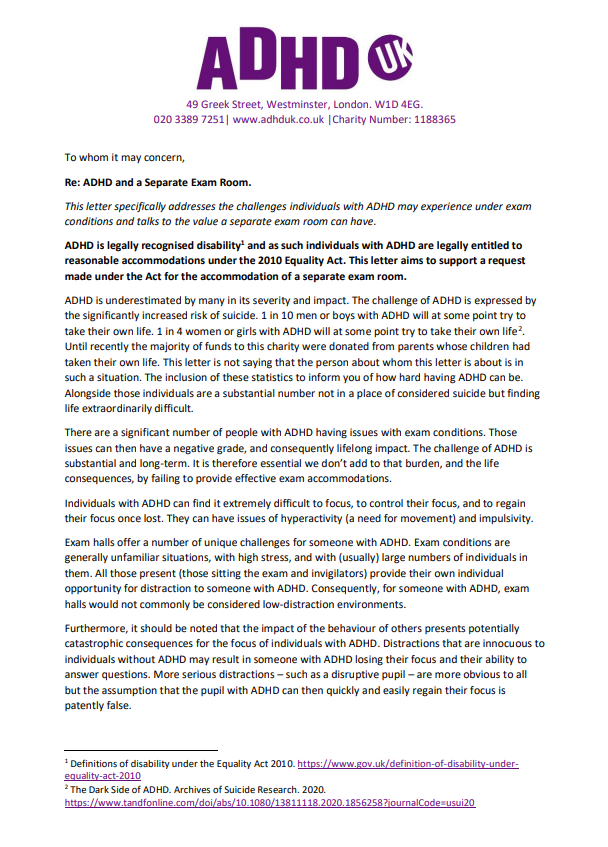Support for Additional Exam Time
Supporting you in your request for a additional exam time for a pupil with ADHD
Additional time is a very significant reasonable accommodation for someone with ADHD.
To support individuals in their request for extra time we’ve created a downloadable letter for you. Click here or the document image to download it.
You can also read the full text below.

To whom it may concern,
Re: ADHD and extra time in exams (and other time-controlled) conditions.
This letter specifically addresses the challenges pupils with ADHD may experience under exam conditions and talks to the value extra time can have.
ADHD is legally recognised disability[1] and as such individuals with ADHD are legally entitled to reasonable accommodations under the 2010 Equality Act. This letter aims to support a request made under the Act for 25% extra time.
ADHD is underestimated by many in its severity and impact. The challenge of ADHD is expressed by the significantly increased risk of suicide: 1 in 10 men or boys with ADHD will at some point try to take their own life; 1 in 4 women or girls with ADHD will at some point try to take their own life[2]. Until recently the majority of funds to ADHD UK were donated by parents whose children had taken their own life. This letter is not suggesting that the person named about is a suicide risk, but that the intent of including these statistics is to illustrate just how hard having ADHD can be. Alongside those individuals are a substantial number not considering suicide but finding life extraordinarily difficult.
A large proportion of people with ADHD have particular issues with timed conditions. Those issues can negatively impact grades, and consequently lifelong outcomes. The challenges of ADHD are substantial and long-term. It is therefore essential that we don’t add to that burden, and its life consequences, by failing to provide effective exam accommodations.
Individuals with ADHD can find it extremely difficult to focus, to control their focus, and to regain their focus once lost. They can have issues of hyperactivity (a need for movement) and impulsivity.
Exams and other timed evaluations have long recognised that the burden from a time restriction is not equally distributed. For some pupils, it prevents them from showing their real capability. Hence, the well-established extra-time system.
Timed conditions offer a number of unique challenges for someone with ADHD. Timed conditions are directly penalising for the time lost to vanished focus. There can be significant challenges in: lost time in corralling focus to start, losing focus to distractions and then losing further time in the challenge to regain focus back to the task or question in hand.
Challenges in task switching is common for people with ADHD. Most controlled conditions require rapid switching between questions, topics, and sections. The struggle to switch can lead to substantial lost time. Time can also be lost into hyperfocus – meaning far too much time is spent on one section – leaving little for others. Having compensating extra time can be very helpful to compensate.
Many with ADHD will struggle to track time. That makes using the appropriate amount of time per question particularly hard and also means the exam time isn’t used as effectively as others.
Impulsivity, an aspect of ADHD, can mean jumping questions, jumping around answers, and hopping pages. Having adequate time to go back and ensure all questions have been answered and answered adequately is essential. Something extra time can significantly help with.
Hyperactivity, the H in ADHD, often expresses itself as a regular, sometimes almost constant, need for movement. A lack of movement for many quickly builds into an intense pressure that must be released. Exam conditions often deprive pupils of almost all movement options. This can lead to particular issues for pupils with ADHD. Any formal movement breaks or informal movement breaks (i.e. through toilet requests) should be compensated for with extra time. It should also be noted the additional challenge and time it takes to refocus after any such break.
Significant numbers of people with ADHD will talk about the issue and paralysis of being overwhelmed. Overwhelm describes the internal complexity of the moment leading to a block or even shutdown on effectiveness. Important time can be lost to overwhelm. Timed conditions can considerably increase the likelihood of overwhelm occurring, and allowing for extra time can create a much-needed buffer in reducing the anxiety that can lead to overwhelm.
In consideration of the above issues we strongly suggest, under the 2010 Disability Act for Reasonable Accommodations with regards to ADHD, you provide extra time for an individual with ADHD. The risks and consequences of not doing so represent a considerable potential lifetime cost to the individual with ADHD.
Organisations do have the right to refuse such a request under the Disability Act 2010; however, the onus is on them to provide evidence that extra time is not a reasonable accommodation. That evidence can then be legally challenged.
Please note that provision of a separate exam room is a separate issue.
We are passionate in our view that a extra time is a reasonable accommodation for an individual with ADHD. We therefore offer our backing to request and appeal any rejections of such requests. We would also offer support in any legal challenge should any individual, parent, or caregiver be minded to pursue such an avenue.
Thank you for your time and consideration in this matter.
Kind regards,
ADHD UK.
[1] Definitions of disability under the Equality Act 2010. https://www.gov.uk/definition-of-disability-under-equality-act-2010
[2] The Dark Side of ADHD. Archives of Suicide Research. 2020. https://www.tandfonline.com/doi/abs/10.1080/13811118.2020.1856258?journalCode=usui20
We use feedback to be the best we can be. If you have feedback on this letter or page please click here.

